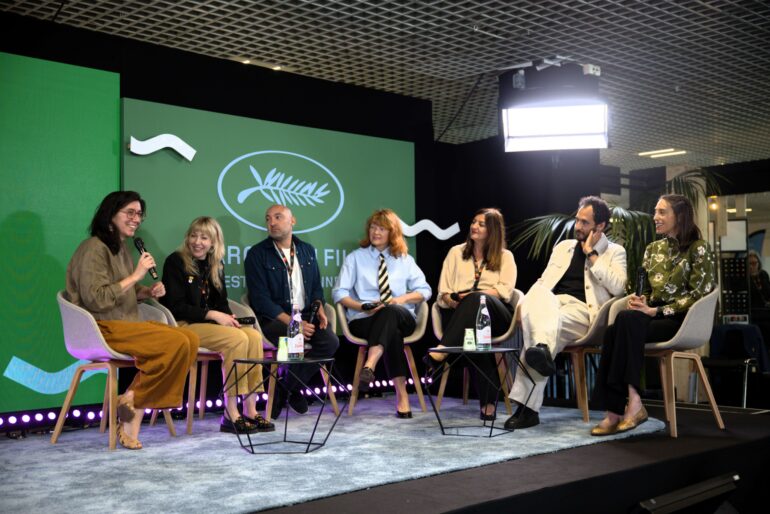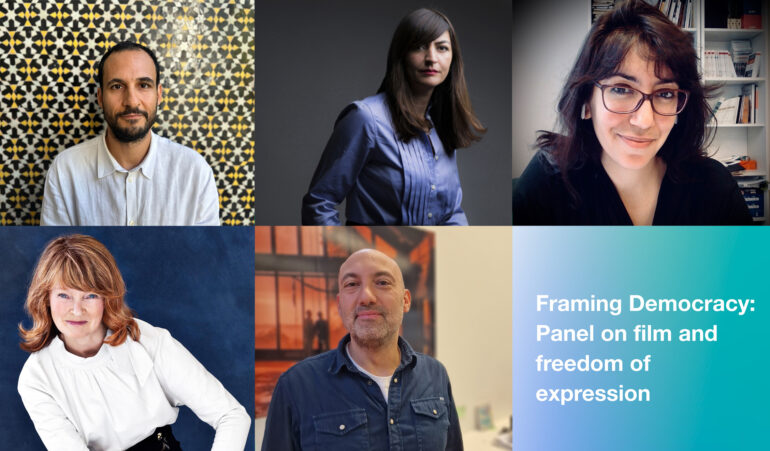Written by: Davide Abbatescianni
20.05.25
As democracy falters, Nordic film leaders at Cannes urge cinema to resist silence, censorship, and cultural complacency.
At a time when democratic institutions are being tested by rising polarisation and waves of disinformation, the five Nordic film institutes convened a compelling panel discussion at Cannes’ Marché du film (13-21 May) to ask a pressing question: What role can cinema play in defending democracy? Framing democracy not as a given, but as a project in need of constant reinvention, the session brought together filmmakers, producers, and institutional leaders to debate the challenges and opportunities facing cinema as a tool for societal resilience.
Moderated by Rebecca Leffler, France Correspondent for Screen International, The Five Nordics conversation featured writer-director Ali Abbasi, producer Didar Domehri, Fantastic Fest director Lisa Dreyer, FERA CEO Pauline Durand-Vialle, Danish Film Institute CEO Tine Fischer, Norwegian Film Institute CEO Kjersti Mo, and producer and sales agent Jean-Christophe Simon.
Setting the Stage: Cinema as a Democratic Mirror
Opening the session, Kjersti Mo framed the “elephant in the room”: the increasing fragility of democratic structures. “We live in a world full of stories, yet the foundations of democratic society are being tested,” she stated. “Cinema is not just entertainment — it’s a mirror, a megaphone, and a meeting place. It lets us see the world through the eyes of others.”
The Nordic region, Mo underlined, has long believed in the power of culture to shape society. Nordic films reflect values such as openness, justice, and equality. But these values, she warned, “must be protected and nurtured — they’re not a given.”
Mo positioned the panel as a “call to action”: a chance to reflect on how cinema can foster dialogue in divided times and ensure that screens remain spaces for truth, empathy, and hope.
Leffler began by asking the panellists how they define democracy — a question that yielded layered responses.
Ali Abbasi highlighted the elasticity of the concept. “You can say Russia is a democracy, Iran is a democracy, and Denmark is too — but with different tweaks,” he said. “As long as the majority decides and the minority isn’t hurt, that’s roughly democracy.”
Tine Fischer distilled it to three key components: free and fair elections, institutional protection for artistic freedom, and institutional protection for media freedom. Next, Simon echoed the Greek etymology: demos kratos — power to the people.
For Domehri, democracy in the context of Europe’s audiovisual sector is about the freedom to tell diverse stories. “Cannes is the festival where those films can change the way we see the world,” she added.
The Ironies and Limits of Democratic Culture
Abbasi, however, cautioned against romanticising the industry’s democratic potential. “Filmmaking is an elitist endeavour. If the French population truly voted on what to watch, we’d probably be making comedies with cheese and wine close-ups, or films set during WW2 or the 1970s,” he quipped. “That too is democracy.”
His latest film, 2024 Palme d’Or contender The Apprentice, involving deep research into Donald Trump — whom he met personally — reflects the uncomfortable truth that Trump's rise was a democratic outcome. “We can't just love democracy when it works in our favour,” he stressed.
Dreyer also highlighted how democracy can be used against itself. “Trump was democratically elected, but what he’s doing with that power is threatening everyone — including his own voters.”
Dreyer also warned about the fragility of support systems for independent film: “Smaller festivals championing diverse voices are losing funding. We are, frankly, happy idiots — it’s scary.”
Institutional Fragility, Self-Censorship New Tech, and Geoblocking
Fischer raised the alarm over the creeping danger of “soft self-censorship”. “It’s the gradual process where creators stop applying for support for certain projects,” she noted. “Freedom isn't just a principle — it’s embedded in institutions.”
Simon affirmed that as a distributor he is increasingly acting as a political activist. “We’ve always distributed politically engaged films. Reality is threatened, and we’ve become activists by default.”
Durand-Vialle pointed to co-productions as a lifeline. “When a country becomes a hostile environment for production, what often saves filmmakers is collaboration across borders — co-productions and working with producers from neighbouring countries.”
Later, Fischer called for broader recognition of the Nordic cultural policy model, which ensures institutional independence and grants that uphold freedom of expression.
Yet, the conversation soon turned to the constraints imposed by global platforms and big tech. Abbasi described how power has migrated from states and public broadcasters to opaque tech corporations. “Platforms like Netflix have no incentive to host problematic content. Why would they?” he asked.
He offered a striking anecdote: “In Denmark, Ekstra Bladet used to have a pin-up girl on page nine. The only ones who managed to remove it? Apple. They said: “We don’t do nudity.” That wasn’t society or government — that was a corporation.”
Durand-Vialle expanded on the dangers of algorithm-driven storytelling. “Editorial decisions will be increasingly based on data, not creativity. Filmmakers may be losing control — final cut may be disappearing. It’s not storytelling anymore, it’s content experience.”
Asked about concrete solutions, Durand-Vialle admitted the challenges are enormous. “Trends change daily. But public funding is still key — along with legislative pillars safeguarding authors’ rights and control over intellectual property,” she said. “Still, we must find a way to make this economically viable — and I honestly don’t have all the answers now,” she laughed.
Simon highlighted the threat of removing geoblocking. “If abolished, it could destroy the European film industry. Big players might survive, but niche stories — from Hungary or the Czech Republic, for example — would disappear. We need to keep telling stories locally.”
Toward a Cultural Programme of Our Own
Fischer pointed out the paradox of Abbasi’s stance: “He always said he didn’t want to make political films, but after The Apprentice premiered at Cannes last year, he stood up and said: ‘Now is the time.’”
Abbasi, however, returned to the fundamental problem: the speakers’ side of the ideological divide— broadly liberal, progressive, democratic — is lacking a coherent programme. “The other side has a clear socio-political and cultural strategy,” he said. “We, on the other hand, are full of contradictions. We prioritise some conflicts over others without a clear framework, for example Ukraine over Gaza or Somalia.”
He criticised the bureaucratic inefficiencies of European support systems, calling them the “bad versions of what we want”. “If we’re serious about democracy, why do we need a dozen country stamps to justify public funding? Ideologically, that doesn’t make sense.”
Abbasi urged a stronger presence in the public debate. “We don’t need everyone to make political films, but we do need more films about the present. It’s alarming to see how many films are still set during WWII or in the 1970s — why aren’t we making more films about today? The last film I made was set in the 1970s, so I blame myself too.” His closing note was a call for urgency: “When we fail to intervene, we leave a vacuum. And that’s where the right-wing influencers come in.”
In a fast-changing media landscape, the panel discussion offered no easy answers, but underscored one clear imperative: Films — and the policies that support them — must actively defend the values they claim to represent. In polarised times, silence is complicity. Cinema, when brave enough, remains a powerful voice for those who risk losing theirs. In this context, The Five Nordics can — and must — play a crucial role, leading by example through strong public support, cross-border collaboration, and a steadfast commitment to freedom of expression.

